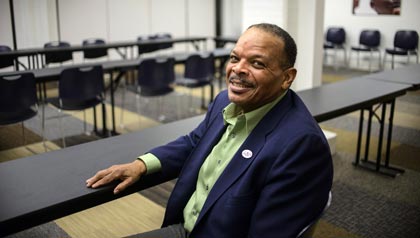AARP Hearing Center

• Hillel Kuttler
Michael Burke recently decided to purchase a home near his Baltimore office but a barrier stood between him and his dream: At age 59, he’d never used a credit card, borrowed from a bank or taken out a loan.
When he told friends and relatives of his situation, they discouraged him from proceeding with buying a house.
But since attending an AARP Foundation Finances 50+ program, Burke is establishing credit and later this year expects to move into the first home he’s ever owned.
Cosponsored by the Charles Schwab Foundation, Finances 50+ helps older Americans handle their money prudently. In 90-minute workshops held in three consecutive weeks, participants learn to set financial goals, create a budget, utilize credit cards sensibly, save money and protect their assets.
The workshops are small (usually five to 15 people) to foster dialogue, and exercises are assigned and discussed. “We specifically call it a financial capability program … because it calls for action,” said Donna Ortega, AARP Foundation program manager for income projects, noting that attendees are encouraged to take specific actions to improve their financial situation.
Free program in 7 cities
While open to anyone, the free program is geared to lower-income older people “because they’re going through a lot right now,” Ortega said. They might have “done everything right” and saved for impending retirement, only to face unexpected financial challenges after being laid off or having grown children move back home, she explained.
The program was launched in September in seven cities: Baltimore, San Francisco, New Orleans, Denver, Phoenix, Austin and Washington. It is run by AARP-partner organizations that train employees and volunteers to facilitate the workshops. Follow-up sessions with volunteer “money mentors” can also be arranged at no charge.
Laura Bruner, a program associate with the Baltimore CASH (Creating Assets, Savings and Hope) Campaign, an AARP partner that hosts many of the programs, said Finances 50+ is reaching those who can benefit from its practical information.
“I’ve had people come up to me after the classes in tears,” she said. One man was about to lose his home because he owed back taxes. Bruner suggested he call legal aid services and provided him with the phone number. The man told Bruner that he didn’t think people cared about his predicament.
“I think that there’s a lot of fear around money,” she said. “Finances are such a personal thing. It can be very overwhelming.”
How one man took action
The program certainly helped Burke, who works in logistics and administration for AARP Experience Corps. He didn’t even know about Finances 50+ until he happened to set up a room for one of its workshops in November. When he checked the room later to make sure everything was running smoothly, the session facilitator was telling the group, “If you need to take charge of your credit, this is what you need to be doing.”
The facilitator’s words moved Burke to action. He’s since acquired a credit card, budgets his spending, shops less frequently and smarter, and makes only periodic ATM withdrawals of cash to minimize bank fees.
“My habits are different now—very different,” Burke said. “Money is real, and you have to have [financial] goals when you get older.”
Upcoming workshops are scheduled for May 6, 10, 13 and 20 in Baltimore and June 25, 26 and 27 in Catonsville.
Hillel Kuttler is a freelance writer living in Baltimore































































